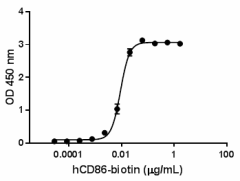- Regulatory Status
- RUO
- Other Names
- CD86, B7-2, T lymphocyte activation antigen CD86, Activation B7-2 antigen, CD28 antigen ligand 2, CD28LG2B7-2 antigen, B70, BU63, CTLA-4 counter-receptor B7.2, FUN-1
- Ave. Rating
- Submit a Review
- Product Citations
- publications

-

When human CTLA-4 (Cat. No. 591902) is immobilized at 1.0 µg/mL, Human B7-2/CD86-Fc Chimera Biotinylated Protein binds with EC50 of 8 - 32 ng/mL. HRP Avidin (Cat. No. 405103) was used to detect the binding. -

Stability testing for Human B7-2/CD86-Fc Chimera Biotinylated Protein. Human B7-2/CD86-Fc Chimera Biotinylated Protein was aliquoted in PBS, pH 7.2, 5% Glycerol at 0.2 mg/mL. One aliquot was frozen and thawed four times (4x Freeze/Thaw), and compared to a control kept at 4°C (Control). The samples were tested for their ability to bind immobilized human CTLA-4 (Cat. No. 591902).
CD86, also known as B7-2, is a member of the cell surface immunoglobulin superfamily. B7 family members are transmembrane molecules that exist predominantly as monomers. They are classified into three groups according to their functions. Group I members include B7-1, B7-2, and B7-H2. These members are either co-stimulatory or co-inhibitory in modulating T cell response. Group II members include B7-H1 (PD-L1) and B7-DC (PD-L2) which are ligands for PD-1. These members are involved in regulating induction and maintenance of peripheral immune tolerance. Group III members include B7-H3 and B7-H4 whose role in T cell regulation has yet to be defined. CD86 is expressed on activated B and T cells, macrophages, dendritic cells, and astrocytes. CD86, along with CD80, is a ligand of CD28 and CD152 (CTLA-4). CD86 is expressed earlier in the immune response than CD80. CD86 has also been shown to be involved in immunoglobulin class-switching and triggering of NK cell-mediated cytotoxicity. CD86 binds to CD28 to transduce co-stimulatory signals for T cell activation, proliferation, and cytokine production. CD86 can also bind to CD152, also known as CTLA-4, to deliver an inhibitory signal to T cells.
Product DetailsProduct Details
- Source
- Human B7-2/CD86, amino acid Leu20-His245 (accession # P42081) with a C-terminal human IgG1 (Pro100-Lys330) and 6x His tag expressed in 293E cells.
- Molecular Mass
- The unlabeled 465 amino acid recombinant protein has a predicted molecular mass of approximately 52.9 kD. The DTT-reduced protein migrates at approximately 70 kD and non-reduced protein migrates at approximately 140 kD by SDS-PAGE. The predicted N-terminal amino acid is Leu.
- Purity
- >95%, as determined by Coomassie stained SDS-PAGE.
- Formulation
- 0.22 μm filtered protein solution is in PBS, pH7.2, 5% Glycerol
- Endotoxin Level
- Less than 0.1 EU per µg protein as determined by the LAL method.
- Concentration
- 10 and 25 µg sizes are bottled at 200 µg/mL. 100 µg size and larger sizes are lot-specific and bottled at the concentration indicated on the vial. To obtain lot-specific concentration and expiration, please enter the lot number in our Certificate of Analysis online tool.
- Storage & Handling
- Unopened vial can be stored between 2°C and 8°C for one month, at -20°C for six months, or at -70°C for one year. For maximum results, quick spin vial prior to opening. The protein can be aliquoted and stored at -20°C to -70°C. Stock solutions can also be prepared at 50 - 100 µg/mL in sterile buffer (PBS, HPBS, DPBS, or EBSS) containing carrier protein such as 0.2-1% BSA or HSA and stored in working aliquots at -20°C to -70°C. Avoid repeated freeze/thaw cycles.
- Activity
- When human CTLA4a-Fc is immobilized at 1.0 μg/mL (100 μL/ well), biotinylated human CD86-Fc Chimera binds with an EC50 of 8 - 32 ng/mL. HRP Avidin (Cat. No. 405103) was used to detect the binding.
- Application
-
Bioassay
- Application Notes
-
BioLegend carrier-free recombinant proteins provided in liquid format are shipped on blue ice. Our comparison testing data indicates that when handled and stored as recommended, the liquid format has equal or better stability and shelf-life compared to commercially available lyophilized proteins after reconstitution. Our liquid proteins are verified in-house to maintain activity after shipping on blue ice and are backed by our 100% satisfaction guarantee. If you have any concerns, contact us at tech@biolegend.com.
Antigen Details
- Structure
- Disulfide-linked homodimer, biotinylated via amines
- Distribution
-
Activated antigen presenting cells, including B cells, dendritic cells and macrophages
- Function
- B7-2 is a costimulatory molecule that is required for T cell proliferation and IL-2 production.
- Interaction
- Leukocytes, endothelial cells
- Ligand/Receptor
- CD28, CTLA4
- Bioactivity
- Measured by its ability to bind human CTLA4-Fc Chimera
- Cell Type
- Antigen-presenting cells, B cells, Dendritic cells, Macrophages
- Biology Area
- Cell Biology, Costimulatory Molecules, Immunology, Neuroscience, Neuroscience Cell Markers
- Molecular Family
- CD Molecules, Soluble Receptors
- Antigen References
-
- Freeman GJ, et al. 1993. Science 262:909.
- Chen C, et al. 1994. J. Immunol. 152:4929.
- Lanier LL, et al. 1995. J. Immunol. 154:97.
- Carreno BM, Collins M. 2002. Annu. Rev. Immunol. 20:29.
- Rudd CE, et al. 2009. Immunol. Rev. 229:12.
- Wing K, et al. 2011. Trends Immunol. 32:428.
- Gene ID
- 942 View all products for this Gene ID
- UniProt
- View information about B7-2 on UniProt.org

 Login / Register
Login / Register 













Follow Us